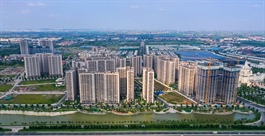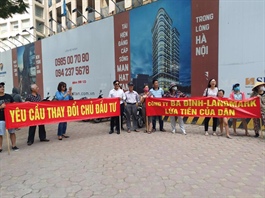Real estates companies pivot on remote work trends
Real estates companies pivot on remote work trends
New flexible working methods are seeing a slew of real estate players revamping their approach to take advantage of the market and meet the growing demand for travel and remote work from clients.

Anthony Lu, the Vietnam regional director for Booking.com, believes that telecommuting will become a long-term trend, and a recent poll conducted by Crowne Plaza Hotels & Resorts reveals noteworthy to support this. The poll shows that 65 per cent of millennials (ages 25 to 44) and 59 per cent of Gen Z customers (ages 18 to 24) want to work for organisations that provide frequent travel, flexible work hours, and the option to work during holidays.
About 35 per cent of respondents feel there are advantages to mixing work and travel overseas and 36 per cent of respondents want to spend an additional 1-2 days on leisure and travel activities if their vacation is linked with future business visits.
Although in Vietnam the wave of "digital nomads," a term referring to the new generation of workers who have been travelling and working without being tied to a particular location, is not yet strong, the community believes that this market is an appealing prospect due to its distinctive cultural identity, spectacular landscapes, diverse cuisine, and affordable living expenses.
This has prompted certain luxury resort brands to plan to open additional hotels to meet market demand. For instance, Sun Property Group (a subsidiary of Sun Group) established the Sun Marina real estate complex near Yacht Bay in Quang Ninh in 2021 to fulfil the different demands of investors, including residential and integrated rental or independent working and resort space inside the same unit.
Sun Property anticipated that this project would facilitate new forms of tourism, such as retail and exploration. Sun Marina's experiences will be one of the driving factors in boosting the number of tourists to Ha Long, which receives around 5 million people annually.
Crowne Hotels & Resorts Plaza has just debuted the Crowne Plaza Vinh Yen City Center hotel. In addition to modernising 50 per cent of its current hotel portfolio of more than 400 properties, the brand intends to construct 107 new hotels (about 27,342 rooms) during the next three years.
According to Benjamin Schwarz, General Director of Crowne Plaza Vinh Yen City Centre, the organisation is implementing concepts to satisfy the demands of the business-resort tourist sector globally.
Crowne Plaza Phu Quoc Starbay and Crowne Plaza Vinh Yen City Center have officially launched in Vietnam. Approximately 50 per cent of the brand's worldwide network of over 400 hotels is currently renovating.
New trends
As highlighted by top hotel managers earlier in the year, the business travel market will return first, followed by the meeting, incentive, and conference industries in the second half of this year. However, Vietnam's lodging industry will take around two years to return to pre-epidemic rates.
Long stays and family vacations will be the trend in the future. According to the Airbnb application, as much as 30 per cent of long-term stay reservations are in 200 global locations. In 2021, more than 100,000 visitors stayed in Airbnb flats for at least three months.
In Vietnam, group travel (families, groups of friends) is anticipated to be the most prominent trend in the coming year. And the tendency toward flexible, remote employment continues to expand.
Family is an integral element of the trend of combining work and vacation. Life, work, and travel are inextricably linked for entrepreneurs and freelancers. As a result, hotels now cater to business travellers.
However, Schwarz, stated that hotel managers and operators must recognise that business clients are no longer the same as leisure ones since there is an increasing number of business travellers who travel with their families. In addition, hotels must invest in adaptable amenities and areas that accommodate guests of various ages.
In addition, business travellers' increased need for privacy, sanitation, and longer stays necessitates that hotels and alternative lodgings significantly improve their job-related services. To attract affluent and technologically sophisticated visitors, Vietnam must establish a playground with enticing and competitive rates.
According to Doan Van Binh, chairman of CEO Group, Vietnam requires an open visa policy; the development of a system to issue a digital nomad visa to entice foreigners to mix tourism and remote work, and the association of this mechanism with the foreigners' second home policy.





















